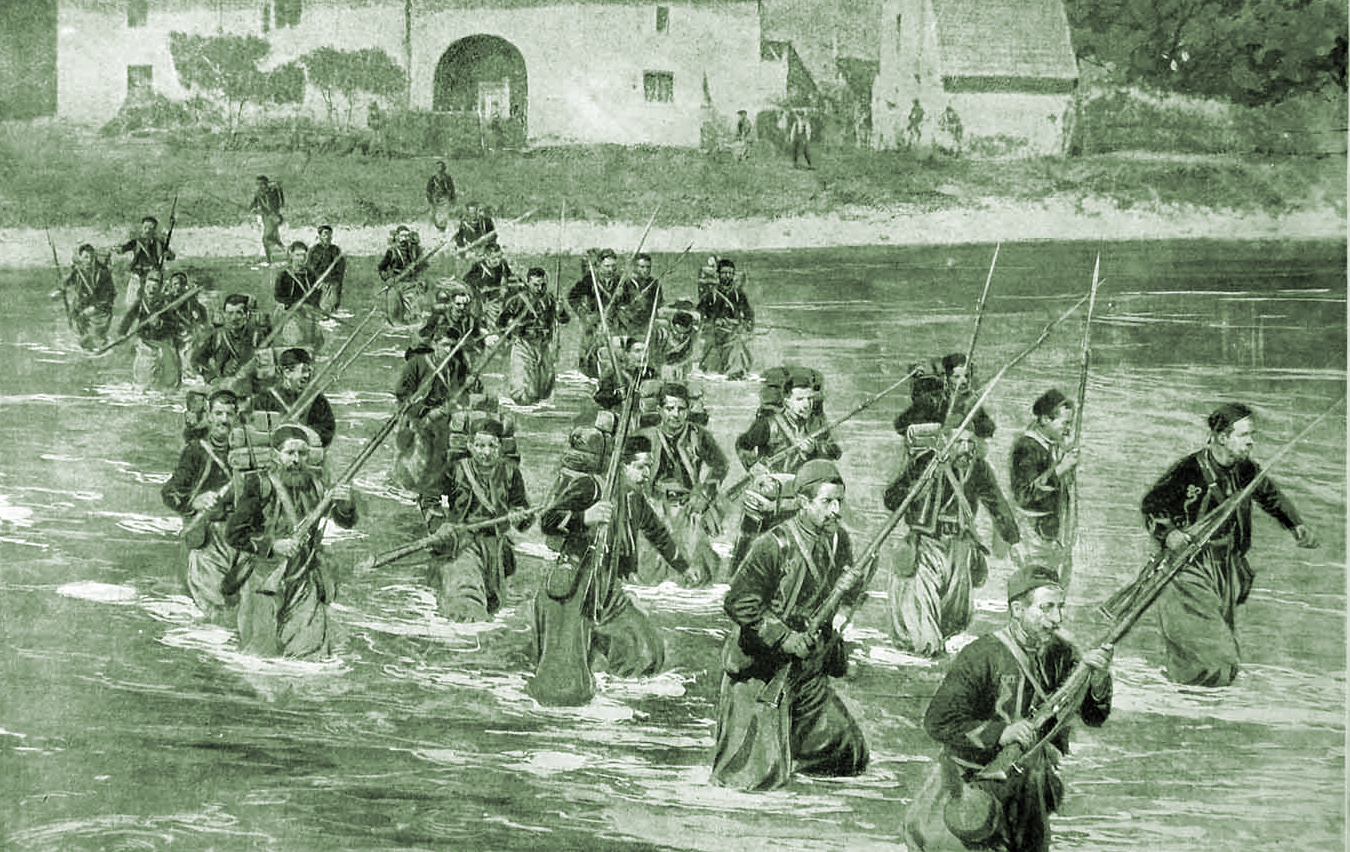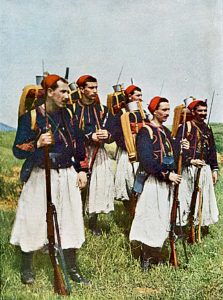 Zouave soldiers crossing a river in northern France in World War I, preparing to attack German trenches. A large minority of the North African Zouaves were Jewish. [Image from the London periodical The Graphic, April 10, 1915.]
Zouave soldiers crossing a river in northern France in World War I, preparing to attack German trenches. A large minority of the North African Zouaves were Jewish. [Image from the London periodical The Graphic, April 10, 1915.]
Today’s “guest blogger” from the past is a rabbi who served in World War I. Under the pen name “A Jewish Chaplain” (“Un Aumônier Israelite”), he wrote articles about his wartime experiences for the French Jewish magazine L’Univers Israélite.
In 1915, he was chaplain to the Jews in an Algerian division of Zouaves (French light-infantry forces, originally recruited from African countries that France had invaded and colonized). Below, our anonymous rabbi tells us how he and his minyan sought Purim joy and comfort in perilous conditions, close to the front line.
Memories of Purim at the front
(L’Univers Israélite, March 24, 1916.
Translation from French ©2017 by Steven Capsuto.)
Circumstances keep me from celebrating Purim among soldiers this year, and so my thoughts return to a year ago when I was just starting out as a chaplain.
I arrived at the front a few days before Purim. At my request, I had been assigned to an Algerian division. I suspected there must be a number of our believers there, but I did not know any of them and did not know how to find them. I considered trying an approach that had served me well a few weeks earlier in Saint-Denis, when I had wanted to identify some Jews among the Zouaves stationed there. I had posted myself outside the door to their quarters, and each time a Zouave came out, I would ask, “Do you know Shema Yisrael?” “No, I don’t,” replied one. “Which company is he in?” asked another. “I knew someone with a name like that, but he’s not here anymore.” After other disheartening responses, finally one Zouave’s eyes lit up at my question, letting me know he had understood. Through him, I met other Algerian Jews, but one after the other, they were all leaving the depot for the front. I felt the urge to rejoin them.
But how could I find them again? Standing outside the trenches and resuming my Sibyl-like questions would have caused suspicion. Another solution was needed. I did not even have to search. The day after I arrived, a battalion of Zouaves passed me as they were going off duty. I followed them to the first village, where I presented myself to their commanding officer. “The division’s Jewish chaplain, at your service.” “Oh! Well, I don’t need your services myself, but there are about fifty of your coreligionists in my battalion, and I’d be glad if you could gather them from time to time. They like to hear talk of religion and family, and your attention will do wonders for their morale. So count on my support. When do you want to start?” “This evening, sir, with your permission. It’s Friday and we will hold a Sabbath service. But how can we notify my congregation?” “Nothing could be simpler: I’ll put a note in the report and everyone will know.”

Zouaves who had fought in France in the Battle of Barcy. [Color photograph from Vol. 1 of the published photo set Les Champs de Bataille de la Marne.]
At sunset, more than thirty of us gathered in an open-air shed—the only available space we could find. Some candles illuminated the rustic setting. That is how the Cabbalists of sixteenth-century Palestine welcomed the Sabbath, out in the open. There was a bit of the Cabbalist about us. So we recited the service with reverent joy. You could sense that our brave soldiers were happy to hear the traditional prayers and melodies. Many had tears in their eyes; they forgot the fatigue and dangers of war as their imaginations transported them to their old hometown synagogues beneath the skies of Africa. I took care to translate the main prayers into French for them, and then I gave a short talk about the next day’s special reading, which recalls Amalek’s treacherous aggression against Israel, and the exemplary punishment that Israel would give the Amalekites with God’s help.
We would have liked to continue the next morning, if only to read the text in the original language. But military service comes before religious service. Later, on several Saturdays in summer, I would be able to gather the faithful in the late afternoon to recite Mincha and have a Torah reading. They always took great pleasure in this. I mention it as an example to those civilians who complain that they cannot observe the Sabbath. Let us not be too difficult, and let us try, at least, to salvage Friday evenings and Saturday afternoons (now that workers have half a day off on Saturdays).
Chatting with these Zouaves, I learned of some other Jews in the division. In particular, I learned that there were quite a few in an engineering company, which I hastened to visit. Appropriately for a group of sappers, they were located in actual underground holes. There were more than forty Jews there, so no matter how many were sleeping, I was always sure to find a minyan. The company was bivouacked next to the main walkway of a park, by which one reached the lines. Countless times as I returned from the trenches, I was stopped by a greeting of “Shalom alechem, rabi!” “Shalom alechem, tova uv’racha. Do you know, my friends, that it is time for Mincha?” “Happy to join you, Chaplain.” We would meet at once under the oak trees and say Mincha, not forgetting Arvit.
I chose to bunk down among the sappers on Erev Purim. Since we could not gather and light lights out in the open so close to the enemy, the company captain kindly let us use the office and the drafting room. Sadly, there was no Megillah and we had to read the story of Esther without blessings. But then, who is to say that this was a problem? Doesn’t our tradition point out that God’s name is absent from this story? I found a suitable topic for the sermon in the figure of Mordecai: a good citizen and good Jew, loyal to his king (which is to say, his country) and devoted to his people and his religion. After the ceremony, we exchanged gifts, which is customary: I offered chocolate and items from Paris, and they offered me cigarettes from Algeria. Along with the gifts, we exchanged comments that were no less pleasant. Such brave hearts! I could not wish for a more beautiful community.
I have known Purims that were merrier and more sumptuous, but I have never enjoyed a more warm-hearted one than that Purim at war. Alas, why can I not experience that again this year?
—A JEWISH CHAPLAIN.
